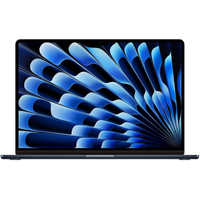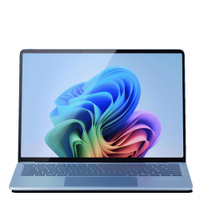When I think of Dell’s XPS 13 series of Ultrabooks, I think of generally good and highly portable laptops that are a bit overpriced. But the Dell XPS 13 (2024), equipped with Qualcomm’s Snapdragon X Elite, is clearly the best of this line thanks to its excellent performance and battery life. Much improved ventilation doesn’t throttle the CPU, the display is phenomenal, and the build quality is leagues better. The only real downsides are the port selection, the inaccessible toolbar, and the steep pricing.
Pros
- +
Excellent performance
- +
Exceptional battery life
- +
Gorgeous OLED display
- +
Criminally portable
- +
Sleek and sexy design
Cons
- –
The worst port selection imaginable
- –
Expensive
- –
Toolbar is still inaccessible
Why you can trust TechRadar We spend hours testing every product or service we review, so you can be sure you’re buying the best. Find out more about how we test.
Dell XPS 13: Two-minute review
The Dell XPS 13 is generally a pretty good series of laptops, usually scoring a four out of five stars rating, though 2022’s Dell XPS 13 Plus received a lower score thanks to build quality issues. But how does the latest one stack up, equipped with the powerful Qualcomm’s Snapdragon X Elite CPU? Quite well actually, as it’s now one of the best Windows laptops and best laptops of the year, coupling its already stellar design and portability with much-improved battery life and performance.
The design is sleek and smooth as you’d come to expect from the XPS line, starting at a mere 2.59 pounds and measuring only 14.8 mm thin. Thankfully, this version also has a high build quality made from machined (CNC) aluminum, ensuring that it can withstand punishment and the daily wear and tear of commutes. It’s available in Platinum or Graphite with a lovely finish that’s surprisingly fingerprint-resistant.
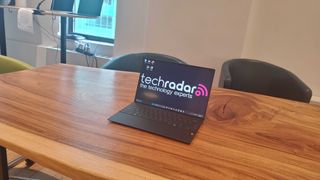
The XPS 13 has three different display types to choose from, including a 3K+ OLED touch display option, which is beyond stunning for a 13.4-inch screen. The bezels are ultra-thin and yet still able to support a 1080p FHD webcam, which sports generally good picture quality.
Sound quality is incredible, largely due to the 360-degree spatial audio with quad speakers and Dolby Atmos. You can clearly hear each instrument, separate from each other and any vocals, while heavy bass loses very little in terms of integrity even at higher volumes.
The new Dell XPS 13 is based on the Plus in terms of its keyboard, with an edge-to-edge design achieved by removing the lattice and a touchpad and wrist rest made entirely from Gorilla Glass with no visible boundaries. The touch-based toolbar also makes its return which, while visually impressive, is just as inaccessible as it’s always been. Both the touchpad and toolbar use haptic feedback in order to give the feeling of pressing a button. But while it can generally work for the former, the latter makes it impossible to know if you hit the right ‘button’ unless you can see it.
Port selection is still absolutely abysmal as it only has two USB Type-C ports, with no combo jack to speak of (RIP if you do audio editing because only Bluetooth works here). It does come with an adapter for the Type-A port but Dell could have easily fit at least one of those and a jack on the actual laptop.
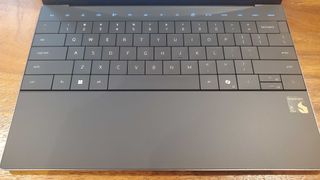
Like other AI PCs, the Dell XPS 13 features AI Copilot+ integration and the infamous Copilot key that Microsoft shoehorned into all its AI laptop keyboards. This key works and automatically connects you to the general Copilot chatbot – a nice little trick but ultimately not very useful.
Dell XPS 13 9345: Benchmarks
Here’s how the Dell XPS 13 performed in our suite of benchmark tests:
3DMark Steel Nomad: 501; Fire Strike: 5,635; Time Spy: 1,925; Wild Life Unlimited: 16,819
Cinebench R23 Multi-core: 11,128
GeekBench 6.3: 2,797 (single-core); 14,635 (multi-core)
PCMark 10 (Home Test): 5,495
25GB File Copy: 20.01 seconds
HandBrake 4k to 1080p encoding: 4: 47 minutes
CrossMark Overall: 1,396; Productivity: 1,300; Creativity: 1,564; Responsiveness: 1,232
Web Surfing (Battery Informant): 19: 26: 24
Battery Life (TechRadar movie test): 17 hours, 24 minutes
Sid Meier’s Civilization VI: Gathering Storm (1080p, Ultra): 21 fps; (1080p, Low): 22 fps
Testing out the Copilot feature on the Dell XPS 13, it works as well as other AI PCs I’ve tried out so far. The chatbot has three levels – creative, balanced, and precise – and all three work quite well. I used my standard testing parameters including math questions, a mock interview, and a novel outline, and each answer cited several sources and made logical sense. There are also other plugins for additional tasks like other conversation types and shopping help.
There are two other features included in Microsoft Paint, Cocreator and Image Creator, that are both powered by AI models. The former turns your drawings into an AI-generated picture, which varies based on the style you choose and the level of ‘creativity’ (how much the finished product is based on your own art versus AI generation). Image Creator, the standard AI image generator, uses a credit system that awards you 50 credits upon sign-up and requires you to pay for more. You’re better off just using the free Cocreator as it’s essentially the same.
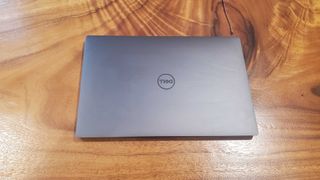
The Windows 11 AI Recall, which was set to launch along with Windows AI PCs, is still unavailable as of this writing due to being kicked back to the Windows Insider Program once the manifold security issues were exposed.
Recall works by creating a database of information on your PC through screenshots automatically taken every few seconds, building up a library of images you can search through AI. However, the Recall database, containing all the data from those screenshots and the overall history of your PC usage, is stored in plain text (in an SQLite database).
This makes it almost effortless for hackers to obtain highly sensitive information such as finances, passwords, work data, and more. It remains to be seen whether this feature will make a comeback, but that solely depends on if Microsoft can fix these massive security issues.
The Dell XPS 13’s benchmark results are very impressive, standing neck and neck with the Microsoft Surface Laptop 7’s own results. The Qualcomm CPU alone carries the laptop, maintaining high levels of performance regardless of the amount of tasks being carried out in the background. Each of these benchmark scores showcases the full range of this laptop in terms of handling productivity work, conference calls, streaming, and more.

Like the other AI PCs released in 2024, the Dell XPS 13 laptop I tested had a Qualcomm Snapdragon X Elite CPU. It not only delivers amazing results in benchmark testing but then translates those results into performance that far outstripes that of earlier XPS 13 models.
While I personally never experienced the same level of performance issues as with the Surface series before the Laptop 7, the Del XPS 13 line did have some hiccups here and there. For example, the XPS 13 Plus I previously reviewed had severe overheating problems that resulted in some sections of the laptop reaching scalding high temperatures. This also impacted performance as it would throttle the CPU.
Thankfully, while this most recent XPS 13 does get a bit warm when pushed to its limits, it doesn’t approach the extremes of before. This means that performance remains consistent no matter how long you run your laptop, perfect for handling heavier workloads.
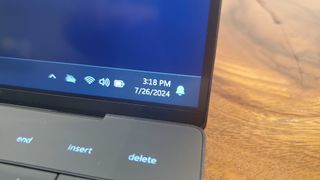
The battery life for the Dell XPS 13 is by far the best out of the Snapdragon-powered laptops that I’ve tested. Under normal use, the battery lasts up to 20 hours with a ‘low’ of over 18 hours.
When continuously video streaming, the battery lasts on average for 17 and a half hours. The fact that a Dell laptop can match and even surpass many of the best MacBook models in battery life is something I would have never expected, but it’s clear Qualcomm has truly outdone itself.
The only downside to Qualcomm’s Snapdragon X Elite CPU is that the ARM support, while incredible compared to prior iterations, still has a few compatibility hiccups – mainly dealing with gaming. But even that improves constantly and the vast majority of users won’t even notice the hiccups as it doesn’t impact everyday use.
Dell XPS 13: Price & availability
- How much does it cost? starting price is $1,299 / £1,099 including VAT / AU$2,299
- When is it available? Available now
- Where can you get it? Available in the US, UK, and Australia
The starting price for the Dell XPS 13 13.4-inch model is $1,299 / £1,099 including VAT / AU$2,299, netting you a Qualcomm Snapdragon X Elite processor with 16GB RAM and 512GB SSD storage in the US, UK, and Australia. Other configurations go up to 64GB/2TB in specs, which will cost $2,499.99 / £1,823.99 including VAT / AU$3,999.60.
It’s far pricier than the Microsoft Surface Laptop 7 and M3 MacBook Air 13-inch but comes with overall much better specs including a superior processor, so if you’re looking for more of an Ultrabook, then this is the choice for you.
Dell XPS 13: Specs
The Dell XPS 13 13.4-inch model starts with a Qualcomm Snapdragon X Elite processor with 16GB RAM and 512GB SSD storage with an FHD+ (1920 x 1200) touch display. The highest configuration goes up to 64GB RAM and 2TB in storage with a 3K OLED (2880 x 1800) touch display.
Swipe to scroll horizontally
| Header Cell – Column 0 | Dell XPS 13 (base) | Dell XPS 13 (highest config) |
|---|---|---|
| Price | Starting at $1,299 / £1,099 including VAT / AU$2,299 | $2,499.99 / £1,823.99 including VAT / AU$3,999.60 |
| Display | FHD+ (1920 x 1200), 60Hz HDR Touchscreen | 3K OLED (2880 x 1800), 60Hz HDR Touchscreen |
| CPU | Qualcomm Snapdragon X Elite | Qualcomm Snapdragon X Elite |
| Graphics | Qualcomm Adreno GPU | Qualcomm Adreno GPU |
| NPU | Qualcom Hexagon, 45 TOPS | Qualcom Hexagon, 45 TOPS |
| RAM | Up to 64GB LPDDR5x | Up to 64GB LPDDR5x |
| Storage | Up to 2TB PCIe Gen 4 SSD | Up to 2TB PCIe Gen 4 SSD |
| Ports | 2x USB 4 Type C | 2x USB 4 Type C |
| Connectivity | WiFi 7, Bluetooth 5.4 | WiFi 7, Bluetooth 5.4 |
| Battery | 55WHr | 55WHr |
| Weight | 2.6lbs (1.19kg) | 2.6lbs (1.17kg) |
| Dimensions | 11.62 x 7.84 x 0.58 ins (295.3 x 199.1 x 14.8 mm) | 11.62 x 7.84 x 0.58 ins (295.3 x 199.1 x 14.8 mm) |
Should you buy the Dell XPS 13?
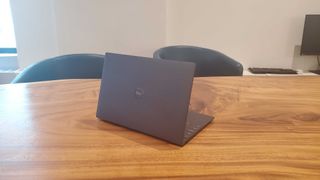
Swipe to scroll horizontally
| Header Cell – Column 0 | Notes | Rating |
|---|---|---|
| Value | Though pricey, it’s worth the cost largely in part due to improvements from the CPU | 4 / 5 |
| Design | As always, the XPS 13 line is sleek and stunning though that toolbar needs to go | 4.5 / 5 |
| Performance | Excellent performance all around, no issues with slowdown or stuttering even with multiple tasks open | 5 / 5 |
| Battery | This is the best AI PC battery life by far – it even surpasses some MacBook models | 5 / 5 |
| Average total | The Dell XPS 13 (2024) is the best of the of line due to great specs, performance, design, and battery life | 4.6 / 5 |
Buy the Dell XPS 13 if…
This laptop handles productivity work like a champ including video calls, documents, web surfing, and more – while never sacrificing performance.
Weighing about two and a half pounds and just over half an inch thick, this laptop redefines thin and light making it the perfect portable machine.
